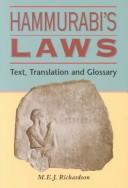| Listing 1 - 8 of 8 |
Sort by
|
Book
ISBN: 396327008X 9783963270086 Year: 2022 Publisher: Münster: Zaphon,
Abstract | Keywords | Export | Availability | Bookmark
 Loading...
Loading...Choose an application
- Reference Manager
- EndNote
- RefWorks (Direct export to RefWorks)
The "Code of Hammu-rapi", the collection of judgments which was compiled under the Old Babylonian king Hammu-rapi in the 18th century B.C., is one of the most important legal historical and literary works of the Ancient Near East. The edition of the Codex Hammu-rapi presented by Joachim Oelsner now offers for the first time the text of all individual text representatives in a synoptic presentation as a score. Variants and divergences within the text can thus be immediately surveyed and weighed against each other. Numerous new, previously unpublished cuneiform texts have been integrated into the edition. The translation also takes into account the variants and divergences. Extensive philological comments supplement the text and the translation. The introduction explains the history of the text and its research; particular emphasis is devoted to the study of previous reconstructions of the gap in several columns on the front of the Hammu-rapi stele in the Louvre.
Law --- History. --- Hammurabi, King of Babylonia. --- Hammurabi,
Book
Year: 1927
Abstract | Keywords | Export | Availability | Bookmark
 Loading...
Loading...Choose an application
- Reference Manager
- EndNote
- RefWorks (Direct export to RefWorks)
Catalogues. --- Hammourabi --- Hammurabi,
Multi
ISSN: 04595831 ISBN: 2204020249 9782204020244 Year: 1983 Volume: 6 Publisher: Paris: Cerf,
Abstract | Keywords | Export | Availability | Bookmark
 Loading...
Loading...Choose an application
- Reference Manager
- EndNote
- RefWorks (Direct export to RefWorks)
Law --- Droit --- Codex Hammurabi --- Code of Hammurabi. --- Droit assyro-babylonien. --- Code d'Hammourabi.

ISBN: 0924171316 Year: 1994 Volume: 15 Publisher: Philadelphia, PA : University of Pennsylvania. University Museum,
Abstract | Keywords | Export | Availability | Bookmark
 Loading...
Loading...Choose an application
- Reference Manager
- EndNote
- RefWorks (Direct export to RefWorks)
Assyro-Babylonian literature --- Littérature assyro-babylonienne --- History and criticism. --- Histoire et critique --- Hammurabi, --- -Akkadian literature --- Babylonian literature --- History and criticism --- -History and criticism --- Littérature assyro-babylonienne --- Code of Hammurabi. --- Inu Anum ṣīrum --- Codex Hammurabi --- Sharīʻat Ḥamūrābī --- Codex Ḫammurapi --- Hammurabi's Code --- Hammurabi Code --- Ḫammu-rabi's Laws --- Code of Ḫammu-rabi --- Laws of Ḫammu-rabi --- Codice Ḫammurabi

ISBN: 184127030X 184127139X Year: 2000 Volume: 73 2 Publisher: Sheffield Sheffield Academic Press
Abstract | Keywords | Export | Availability | Bookmark
 Loading...
Loading...Choose an application
- Reference Manager
- EndNote
- RefWorks (Direct export to RefWorks)
Accadian language --- Akkadian (East Semitic) language --- Akkadian language --- Akkadien (Langue) --- Akkadisch (Taal) --- Assyrian language --- Assyro-Babylonian language --- Babylonian language --- Law --- Droit --- Sources --- Hammurabi, --- 299.219 --- Godsdiensten van Babyloniërs en Assyriërs --- 299.219 Godsdiensten van Babyloniërs en Assyriërs --- Hammurabi --- Iraq --- Babylonia
Book
ISBN: 9780197525401 0197525407 9780197525425 Year: 2020 Publisher: New York : Oxford University Press,
Abstract | Keywords | Export | Availability | Bookmark
 Loading...
Loading...Choose an application
- Reference Manager
- EndNote
- RefWorks (Direct export to RefWorks)
"The Laws of Hammurabi is one of the earliest law codes, dating from the 18th century BCE Mesopotamia (ancient Iraq). It is the culmination of a tradition in which scribes would demonstrate their legal flair by composing statutes on a repertoire of traditional cases, articulating what they deemed just and fair. The scribe of the Laws of Hammurabi advanced beyond earlier scribes in composing statutes that manifest systematization and implicit legal principles. The scribe inserted the statutes into the structure of a royal inscription, skillfully reshaping the genre. This allowed the king to use the law code to demonstrate that Hammurabi had fulfilled the mandate to guarantee justice enjoined upon him by the gods, affirming his authority as king. This tradition of scribal improvisation on a set of traditional cases continued outside of Mesopotamia. It influenced biblical law and the law of the Hittite empire and may have shaped Greek and Roman law. The Laws of Hammurabi is also a witness to the start of another stream of intellectual tradition. It became a classic text and the subject of formal commentaries, marking a Copernican revolution in intellectual culture"--
Law, Assyro-Babylonian --- Scribes --- Copyists --- Assyro-Babylonian law --- Sources --- History --- Code of Hammurabi --- Inu Anum ṣīrum --- Codex Hammurabi --- Sharīʻat Ḥamūrābī --- Codex Ḫammurapi --- Hammurabi's Code --- Hammurabi Code --- Ḫammu-rabi's Laws --- Code of Ḫammu-rabi --- Laws of Ḫammu-rabi --- Codice Ḫammurabi --- Influence. --- Babylonia --- Vavilonii︠a︡ --- Bavel --- Bābil --- Babylonien --- Sumer --- Politics and government. --- 892.12 --- 892.12 Assyrische literatuur --- Assyrische literatuur --- Sources.
Book
ISBN: 2130539637 Year: 2003 Publisher: Paris Presses universitaires de France
Abstract | Keywords | Export | Availability | Bookmark
 Loading...
Loading...Choose an application
- Reference Manager
- EndNote
- RefWorks (Direct export to RefWorks)
Civilization, Assyro-Babylonian --- Civilisation assyro-babylonienne --- Hammurabi, --- Babylon (Extinct city) --- Iraq --- Babylone (Ville ancienne) --- Irak --- Kings and rulers --- History --- Rois et souverains --- Histoire --- Babylonia --- History. --- Khammurabi, --- Hammurapi, --- Chammurapi, --- Hamurabi, --- Hammourabi, --- Hammu-rapi, --- חמורבי, --- حمورابي. --- Vavilonii︠a︡ --- Bavel --- Bābil --- Babylonien --- Sumer --- Kings and rulers.
Book
ISBN: 9780691149974 9780691137223 0691137226 9781400832873 140083287X 0691149976 Year: 2011 Publisher: New Jersey Princeton University Press
Abstract | Keywords | Export | Availability | Bookmark
 Loading...
Loading...Choose an application
- Reference Manager
- EndNote
- RefWorks (Direct export to RefWorks)
In Civilizations of Ancient Iraq, Benjamin and Karen Foster tell the fascinating story of ancient Mesopotamia from the earliest settlements ten thousand years ago to the Arab conquest in the seventh century. Accessible and concise, this is the most current and authoritative book on the subject. With illustrations of important works of art and architecture in every chapter, the narrative traces the rise and fall of successive civilizations and peoples in Iraq over the course of millennia--from the Sumerians, Babylonians, and Assyrians to the Persians, Seleucids, Parthians, and Sassanians. Ancient Iraq was home to remarkable achievements. One of the birthplaces of civilization, it saw the world's earliest cities and empires, writing and literature, science and mathematics, monumental art, and innumerable other innovations. Civilizations of Ancient Iraqgives special attention to these milestones, as well as to political, social, and economic history. And because archaeology is the source of almost everything we know about ancient Iraq, the book includes an epilogue on the discovery and fate of its antiquities. Compelling and timely, Civilizations of Ancient Iraqis an essential guide to understanding Mesopotamia's central role in the development of human culture.
Civilization, Assyro-Babylonian. --- Assyria --- Babylonia --- Iraq --- Antiquities. --- Social life and customs. --- History --- Civilization, Assyro-Babylonian --- Assyro-Babylonian civilization --- Babylonian civilization --- Civilization, Babylonian --- Vavilonii︠a︡ --- Bavel --- Bābil --- Babylonien --- Sumer --- Afghanistan. --- Akkadian literature. --- Alexander the Great. --- Amorites. --- Amu Darya River. --- Annunitum. --- Archimedes screw. --- Assurbanipal. --- Assyriology. --- Babylon, site. --- Balikh River. --- Berlin Museum. --- British Museum. --- Carchemish. --- Chaldaean Catholics. --- Christianity. --- Damascius. --- Eannatum. --- Erlenmeyer Collection. --- Esarhaddon. --- Gaugamela. --- Gnosticism. --- Greek language. --- Hammurabi. --- Hassuna ware. --- Iraq Museum. --- Jeremiah. --- Jesus. --- Julius Caesar. --- Kudur-nahhunte. --- Lachish. --- Manishtusu. --- Nabopolassar. --- accounting. --- astronomy. --- bevel-rimmed bowls. --- caravanserais. --- chronicles. --- decipherment. --- domestication. --- education. --- families. --- fertility. --- frankincense. --- furniture. --- horoscopes. --- iconography. --- kudurrus. --- literacy. --- mathematics. --- minstrels.
| Listing 1 - 8 of 8 |
Sort by
|

 Search
Search Feedback
Feedback About UniCat
About UniCat  Help
Help News
News